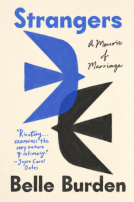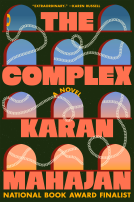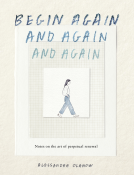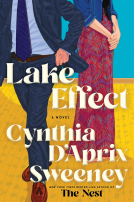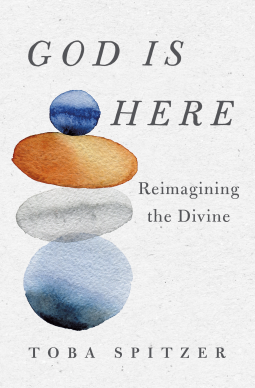
God Is Here
Reimagining the Divine
by Toba Spitzer
This title was previously available on NetGalley and is now archived.
Send NetGalley books directly to your Kindle or Kindle app
1
To read on a Kindle or Kindle app, please add kindle@netgalley.com as an approved email address to receive files in your Amazon account. Click here for step-by-step instructions.
2
Also find your Kindle email address within your Amazon account, and enter it here.
Pub Date Mar 08 2022 | Archive Date Mar 22 2022
St. Martin's Press | St. Martin's Essentials
Description
Toba Spitzer's God Is Here is a transformative exploration of the idea of God, offering new paths to experiencing the realm of the sacred.
Most of us are hungry for a system of meaning to make sense of our lives, yet traditional religion too often leaves those seeking spiritual sustenance unsatisfied. Rabbi Toba Spitzer understands this problem firsthand, and knows that too often it is traditional ideas of the deity—he's too big, too impersonal, and too unbelievable—that get in the way. In God Is Here, Spitzer argues that whether we believe in God or fervently disbelieve, what we are actually disagreeing about is not God at all, but a metaphor of a Big Powerful Person that limits our understanding and our spiritual lives.
Going back to the earliest sources for Judaism as well as Christianity, Spitzer discovers in the Hebrew Bible a rich and varied palette of metaphors for the divine—including Water, Voice, Fire, Rock, Cloud, and even the process of Becoming. She addresses how we can access these ancient metaphors, as well as those drawn from rabbinic tradition and modern science, to experience holiness in our daily lives and to guide us in challenging times. In the section on water, for instance, she looks at the myriad ways water flows through the Biblical stories of the Israelites and emerges as a powerful metaphor for the divine in the Prophets and Psalms. She invites us to explore what it might mean to “drink from God,” or to experience godly justice as something that “rains down” and “flows like a river.”
Each chapter contains insights from the Bible and teachings from Judaism and other spiritual traditions, accompanied by suggestions for practice to bring alive each of the God metaphors. Rabbi Toba Spitzer has helped many people satisfy their spiritual hunger. With God Is Here she will inspire you to find new and perhaps surprising ways of encountering the divine, right where you are.
Available Editions
| EDITION | Other Format |
| ISBN | 9781250764492 |
| PRICE | $28.99 (USD) |
| PAGES | 304 |
Average rating from 28 members
Featured Reviews
I received an ARC of God Is Here, by Toba Spitzer. This was a good book, it had a lot of information on God, and Judaism. Embracing God, and learning to be like him.
 Reviewer 451866
Reviewer 451866
Religion has prepared people for prepare people for ceremonies and teachings. In God is Here, the author takes on a journey of identifying how God's presence is ever present like water in our lives. This is how we learn to be in the world, like the flowing stream.
 Beth P, Reviewer
Beth P, Reviewer
Thank you to NetGalley and St. Martin's Essentials for this advanced reader's copy. In exchange, I am providing an honest review.
Rabbi Spitzer introduces the reader to the metaphors of God and walks us through how to engage with the Divine through the various descriptions of God, familiar or new. "Spitzer argues that whether we believe in God or fervently disbelieve, what we are actually disagreeing about is not God at all, but a metaphor of a Big Powerful Person that limits our understanding and our spiritual lives." (quote from publisher summary)
In fact, Chapter 2 (The God Metaphor), was my favorite of all the chapters because the Rabbi does a really wonderful job of discussing metaphors as they pertain to God and unpacking how we use them in our lives. Her breakdown really resonated with me and my spiritual experiences to this point.
Throughout the rest of the book, I appreciated the insights Spitzer shared about each of the very familiar metaphors of God. What I especially liked about each metaphor breakdown were the practical applications the Rabbi offered at the end of each chapter. I was reminded throughout the book of the gentleness of Judaism, specifically when it is approached as a wisdom tradition and not a fundamentalism way of life, and it made me appreciate the broader worldview that exists outside of fundamentalism.
I loved the challenging and inspiring wisdom found in Toba Spitzer's "God is Here". You will never look at the Divine the same way again. I highly recommend!
At the outset of first-time author Toba Spitzer’s divine new book, God Is Here, she alludes to organized religion being a restaurant where someone hungry will sit down to eat, first checking the menu. In looking at the menu, though, many people may find that nothing winds up looking all that appetizing and will ultimately decide to leave the restaurant. Spitzer — who is an openly lesbian Jewish rabbi — concludes that the problem is that we have too many outdated “metaphors” for whom God is. What she means by that is that we have ideas embedded into language that we use interchangeably. So, when we say, “time is money,” this is a non-literary metaphor for saying that time is a precious commodity, and we should use it wisely. Likewise, “time flows like a river” is a metaphor for how time stretches out endlessly. Thus, one metaphor that we use for God — “God Is a Big Person,” someone who rewards and punishes — might be the sort of thing that will turn some Jewish people (and Christians, to whom this book is also aimed) into atheists who cannot believe that someone has had something terrible happen to them because they offended “God as Punisher” in some way.
I may or may not be doing justice to the conceit of this book, but it is really an extraordinary look at reframing how we view the Divine or Something Else that is out there. By using stories from her personal life as well as from the Hebrew Bible, Spitzer uses imagery such as “God as Water,” “God as a Rock,” “God as a Cloud” and — more recently and scientifically — “God as Electricity,” to confront readers of thinking about new ways and new metaphors for experiencing God (which she refers to as It seemingly to avoid assigning gender, male or female, to God). This is a truly remarkable book that will make readers think about engaging with God in new and less offensive ways. While I’m not sure if this book will turn an atheist into a Jewish follower or Christian, if you are already from a Jewish or Christian background and are struggling with your faith, this might be the sort of thing that you will need to read to reset and recharge you. It should be noted, too, that this is the type of book that might not be best consumed by reading it only once. This is a resource that someone can come back to again and again, to try some of Spitzer’s prompts to turn these metaphors into something physical and concrete. One suggestion I might consider trying is writing my own obituary — it’s a good way to set goals for what you want to achieve while living on Earth, a particular place (and “God as Place” is a new metaphor that Spitzer uses).
There’s probably not a lot more that needs to be said about this book, aside from “go read this now.” However, I should mention that it came into my life at a rather remarkable moment in Canadian history (and I am a Canadian). I’ve been grappling a little bit with my spirituality lately because I live in downtown Ottawa, Ontario. I don’t know if American or international readers of my work realize what’s going on in this location, but a group of hundreds of truckers has convened in this location, occupying it for the past two weeks now to, in my mind, pressure for a change in government undemocratically. These “truckers” or “protesters” (if you want to call them that) have defecated in people’s backyards, stolen food meant for the homeless, honked their truck horns collectively for 24 hours straight with no respect for the 6,000 or so residents who live in the area, and have also flown Nazi and Confederate flags. This is a deeply troubling time for me. I’m trying to work and generally live my life in this chaos, and I have to admit, for the first time in my life, I had to call on another individual to walk me to the grocery store and back yesterday because these Fascists are harassing people in the street and in stores for wearing masks to protect people against COVID. Meanwhile, the police and various civic leaders are doing next to nothing, either because the city has been overrun and the police are outnumbered or because the police have been corrupted and compromised. Ottawa has never seen anything like this before.
That’s what makes a book such as God Is Here so crushingly important to me. It reminds me that there is a God, and It is near, even in the middle of the mess I’m in. The book gave me new ideas for recasting and looking at God’s spirit in new ways. The suggestions are usually quite clear and do-able, and, again, this is probably a book that I’ll have to come back to at some point when I’m not as busy to really engage further with it. It’s kind of too bad that I only have a Kindle Advance Reader Copy of the book, as this is the sort of thing that would probably be best reading as a physical volume, making it easier to bookmark certain passages and be more accessible to revisiting some of the activity prompts that Spitzer has come up with. In any event, I feel that God Is Here is a tremendous, powerful book that reminds me of Barbara Brown Taylor’s best writing, simply from a Jewish perspective. I can’t recommend reading this book more, especially if you’re grappling with the ways God has Being. If you are in a moment of crisis or despair, as I currently am, this book will lift you up on an eagle’s wings (there’s a metaphor for you) and make you feel good about being religious all over again. God Is Here is ground-breaking, and I can’t wait to revisit again.
God Is Here fell into my lap just at just the right time. Spitzer uses just enough Hebrew to open up a passage so that it makes more sense.
Her metaphors didn’t blow my mind, but did give me contemporary examples of how these concepts are timeless. Her personal stories were an inspiration and the applications that she provided were a helpful way to slowdown and reflect in such a busy world.
Thanks to NetGalley and St. Martin’s Essentials for an ARC of this book.
Religion is something very personal to each one of us. I think this is a book that I would recommend to read a few chapters at a time to absorb and think about what the author is saying to you. I needed to read some of it and think about it, to really absorb what she was saying to me. I think everyone will get different things out of this book. I just finished reading it and I can tell I will be thinking about he words in this book and see the way I look and view things now. Thank You Toba Spitzer for letting me read this and give my review on it.
This book came to me at the perfect time. I enjoyed how Rabbi Spitzer personal insight lends itself to her belief in God. I love Judaism. I love how open Rabbi Spitzer is and how her book can contain so much wisdom. This is a book I would come to again and again when I need a recharge or am looking for something. This is a remarkable book and I’m so glad I stumbled upon it when I did. I truly think it was just meant to be.
 Reviewer 725763
Reviewer 725763
In this book, Rabbi Spitzer mines scripture for metaphors of God that take us beyond the prevalent image of a big, all-powerful man in the sky. Depicting God as water, as rock, as fire, these scriptural passages describe a God who is not remote but all around us—a source of life, of protection, of inspiration. The book also offers meditations to help the reader connect with the divine in their everyday lives.
I love how this book helps the reader see God in new ways—in ways that can bring comfort and liberation. It's an invaluable text for anyone looking to connect to the spiritual and the divine.
Thanks, NetGalley, for the ARC I received. This is my honest and voluntary review.
 Joan N, Reviewer
Joan N, Reviewer
While I am a Jesus follower and Spitzer is a Jewish rabbi, I appreciate many of her thought provoking comments on how we think about and experience the divine.
The idea of conceptual metaphors was new to me yet I use them frequently. I might say I was “up” when excited or feeling “blue” when depressed. The metaphors are a way to think about something but do not define it. Conceptual metaphors are used of God and Spitzer explores what is problematic about them and suggests new ways of thinking about God. I am still working on understanding her view of truth. She says we do not discover pre-existing truth but rather observe the world and then formulate truths about it. (128/2865) The same goes for religion.
I appreciate the metaphors Spitzer explores. She writes about God as Water and suggests a new way of thinking of God's power. God as Place reminds us God is here. Every place is sacred. God as Voice (sound) led to insights about silence. God as Rock produced insights into God being refuge and strength. She writes about God as Cloud (by day) and Fire (by night), exploring the invisibility and visibility of God and (fire) one's anger.
Spitzer includes practices to help readers bring the metaphor into the reality of life. She suggests chants, engaging Scripture, singing, silence, and much more. I appreciate she is open to practices from the Christian tradition, such as spiritual direction.
This book is not within my normal reading for my spiritual discipline. I don't agree with everything Spitzer says, such as suggesting God is learning and growing and is continually surprised and confounded by human behavior. (2130/2865) Nonetheless, Spitzer gave me much to contemplate on how I think about God and experience Him. The book would be especially helpful to those wondering about God's existence.
I received a complimentary egalley of this book from the publisher. My comments are an independent and honest review.
 Terri L, Media/Journalist
Terri L, Media/Journalist
Are you looking for a new way to look at the divine? Trying to discover your spiritual side, but don't believe in God as a concept? Rabbi Toba Spitzer examines the concept of God and how it can seem limiting. He discusses how to look at things differently and backs this up with early sources from Judaism as well as Christianity. If you are questioning things, this is the book for you!
 Pamela G, Librarian
Pamela G, Librarian
I received an electronic ARC from St. Martin's Press through NetGalley.
Rabbi Spitzer shares a look at God as so much more. Shared from a Jewish perspective, readers see how God is viewed and could be viewed. Each chapter focuses on a metaphor for a view of God and offers explanations for what is written in the Hebrew Bible. Each chapter ends with recommendations to practice spiritual methods to deepen our individual relationships with God.
Spitzer's writing is clear and reflects the research done to reach her conclusions. She shares with gentle words to encourage readers to explore and learn for themselves with the ultimate goal of deeper relationships.
 Abby S, Reviewer
Abby S, Reviewer
Rabbi Spitzer has written an insightful inspiring book.She teaches us about the divine about the world of Judaism.The Rabbi has a interesting informative style of writing I will be recommending this ,to friends and bookclubs for discussion netgalley #godishere
I enjoyed reading God Is Here by Toba Spitzer. I learned more about Jewish beliefs and traditions which is something I always enjoy doing. I found the tools and suggestions in the book to be very helpful in strengthening my mindfulness & awareness of God's presence in my life.
Rabbi Spitzer gives helpful ways to envision God for those struggling to believe in a "conventional" viewpoint. A healing book for many who want to believe but have been stymied by such obstacles as religious language. Out now.
Thanks to the author, St. Martin's Press, and NetGalley for the ARC. Opinions are mine.
#GodIsHere #StMartinsPress #netgalley
 Nancy F, Reviewer
Nancy F, Reviewer
Finding God Through Metaphor
Thinking of God as a big, powerful being in the sky is uncomfortable for many people. They can’t form a connection. Tobi Spitzer, as a Jewish rabbi is familiar with this problem. In this book, she uses the Old Testament to find metaphors for God that are more relatable in our world.
In the Hebrew Bible, she finds metaphors for God in the real world: Water, Voice Fire, Rock, and Cloud. Metaphor is a way to gain understand something that is difficult to comprehend directly. Spitzer’s book gives us a way to approach and understand God through the real world. I felt her most successful metaphor was water. Water is powerful and flowing, but it can also be gentle.
The use of metaphor promotes the idea that God is here in the natural world and that he can be sensed in many ways. I thought the thesis was a good one. It gives a way to think about and relate to God that is immediate and real not necessarily filtered through words and ideas that are difficult to understand.
In addition to the discussion of metaphor, each chapter has suggestions for bringing alive the ideas. She also provides textual insights from the Bible and well as spiritual traditions such as Judaism and Christianity.
I received this book from St. Martin’s Press for this review.
I was having a bit of trouble formulating my review for this book. Most times when trying to talk about books I aim to tell you how I feel about a book and I also try, even if the book is not for me, to tell you who the book might be intended for.
With this book, it was not intended for me as a reader and I had a lot of trouble finding value in it for a wide audience.
I feel this book would be good for a very narrow group of people. Specifically those in the early stages of their exploration of Judaism and in all stages of understanding GOD contextually.
It goes into great detail as to the many ways of understanding who or what GOD is. It's asking you to reimagine all the ways God is present in your life and also how to bring him to the forefront as you understand him in different ways.
I took it as a testimony to how GOD works in different people's lives and I appreciated the simple idea of using different metaphors when thinking of things religiously.
Thanks to St. Martins Press and Netgalley for sending this my way!
 Shannan H, Reviewer
Shannan H, Reviewer
I'm in the deconstruction phase of my faith, and this book came right on time. This is a book that I plan to refer back to frequently. I especially loved the way the author approached biblical teachings.
Readers who liked this book also liked:
Annabelle Gurwitch
Biographies & Memoirs, Health, Mind & Body, Humor & Satire
Benjamin Reynaert
Arts & Photography, Home & Garden, Reference
Alessandra Olanow
Arts & Photography, Religion & Spirituality, Self-Help

